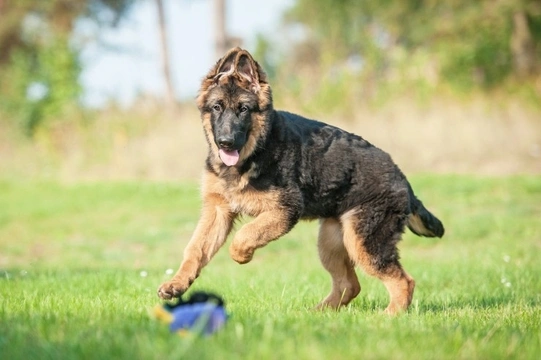Pets
Pets for studWanted petsBreedersAccessories & services
Knowledge hub
Support
Support & safety portal
Training the German shepherd puppy
The German shepherd is one of the most popular large-breed dogs in the UK, and has been a firm favourite among dog owners for many decades now, for good reason. These large, very loyal dogs bond strongly with their families, and also make for excellent guard dogs without having a tendency to be aggressive when properly trained and managed.
They are also one of the most intelligent dog breeds, which means that they are very versatile and can turn their paws to all sorts of different things, from working roles to canine sport to simply life as pets, which is part of the reason for their enduring appeal.
If you have set your heart on owning a German shepherd or have already decided to get yourself a shepherd pup, how you train them and introduce them to the world during their first and most formative year is important, as what the dog learns during this time will stay with them for life!
In this article, we will look at some of the considerations to bear in mind when training the German shepherd puppy, and share some tips on the best way to go about it. Read on to learn more.
German shepherd intelligence
One of the reasons behind why the German shepherd is such a versatile and enduringly popular dog breed is because of their high intelligence, which means that they can do lots of different things. The German shepherd is ranked third out of all of the breeds in terms of their smarts, which means that you need to plan your training protocol to take this into account!
A very intelligent breed like the German shepherd learns quickly and picks up a lot of things by observation alone and so you might find that your shepherd pup takes to training rapidly, and this means that it is important to structure your training sessions to be adaptive and progress at the same speed as your dog.
A pup that gets bored quickly will not be able to learn very effectively, so steer clear of monotonously repeating the same commands over and over again. If your dog has already learnt the command, move on to something else and keep coming back to the learned commands to reinforce them. If your dog doesn’t seem to be picking up a command very well, re-assess the way that you are teaching it to ensure that your dog understands what you are asking of them and again, keep things moving and don’t allow things to get monotonous.
How the dog’s personality influences training
Every dog of course will have their own unique, individual personality, and working with their personality rather than fighting against it is the most successful route to training.
For all of their large size and business-like appearance, German shepherds tend to be soulful, sensitive dogs that take telling off very personally, and so it is important to be encouraging, positive and offer plenty of praise to your pup, and ensure that training is something that is fun and enjoyable for your pup.
Taking the right approach to training
Deciding what approach you want to take to training your pup is important, as this provides you with a framework to work within and some guidance to return to if you feel that you’re losing your way a bit.
Positive reinforcement is the best protocol to follow when training a shepherd, but it is wise to look to the future too, and if you intend to train your dog to follow higher-level or complex commands, such as are used for working roles and canine sport.
Many applications such as these can benefit from the use of a clicker or training whistle to send commands on the go, over distances or without treats, and so it is important to start integrating such methods from the get-go where possible.
However, it is also possible to start working with training tools later on as your dog progresses, and so bear this in mind if you’re not really sure what you would ultimately like to do with your dog.
Socialisation
Socialisation with other dogs and people is important for dogs of all types, but particularly for large breeds like the shepherd that tend to be protective of their home and family, and sometimes speculative about strangers.
You should try to expose your pup to the presence of other dogs of all types and in all sorts of different situations, as well as introducing them to people from all walks of life, and of all ages, races and abilities.
Physical considerations
The German shepherd is one of the various breeds that are prone to hip and elbow problems, which often develop and become apparent during the first two years of life. Additionally, large breed dogs develop more slowly than other breeds, and may not have finished developing physically by the time they are a year old.
This means that you should take care during your training sessions to ensure that the dog is not overexerted or pushed into high-impact physical activity, or encouraged to do anything else that may have a negative impact on their growing joints and bones.



